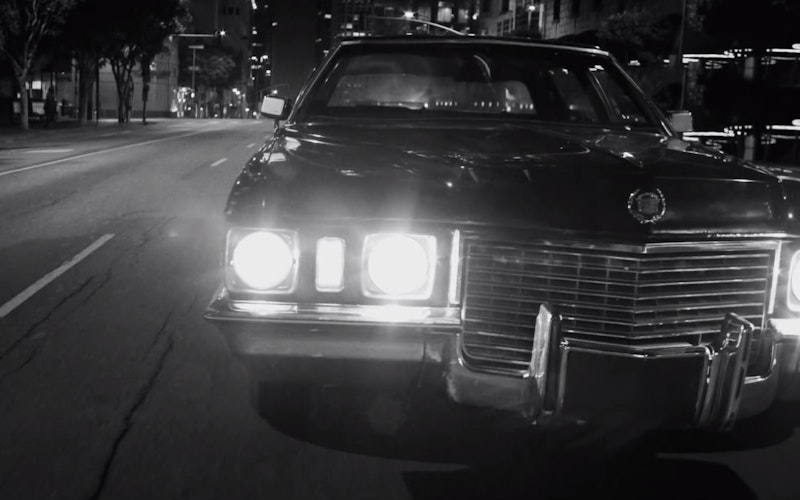
Music
Beach House’s 7: More Than Secular Nostalgia?
Streetlights were coming on, bugs were orbiting our heads, and the fever of summer heat was dissipating when a friend placed his phone on my front porch step and clicked play. The feeble speaker couldn’t compete with the busy night sounds, and I could already tell that its faint sonic murmur wouldn’t work as background noise. At one point, a lovely melody kept breaking through the chatter. I quickly interrupted the conversation to find out what I was hearing. “It’s the new Beach House album.” “Right, but what’s the song?” He picked up his phone. “'Lose Your Smile.'”
You really need headphones, solitude, and space (an empty porch, say) for a band as evocative as Beach House. Even their name is synonymous with escape. It’s not just that the Baltimore duo’s music displays a deep interiority; it’s that their songs seem to be made of the same stuff as memories—tantalizing echoes of some cherished time swallowed by the years. The songs feel recovered, rather than written, as though band members Victoria Legrand and Alex Scally are sonic excavators sharing their findings with us.
Given our culture’s increasingly secular horizon—what Canadian philosopher Charles Taylor refers to as the “immanent frame”—memories often function as surrogates for transcendence. If there’s nothing beyond this world, we often long to go back to some Edenic past that becomes more and more enchanted with distance. The band is in good artistic company, as this was the spiritual project of two of the 20th century’s greatest writers: Marcel Proust and Vladimir Nabokov. In many ways, Beach House’s excavations provide a soundtrack for this uniquely secular form of nostalgia.
The band’s latest foray into this territory is the aptly titled 7—a bold choice that communicates the band’s stability after seven studio albums, as well as confidence in its expanding vision. Bolstering that vision is new producer Peter Kember, who goes by the moniker Sonic Boom. With Kember’s help, the band has given us an album that’s every bit as lustrous as previous efforts, but also one that leaves behind their lo-fi sensibilities for a more densely layered and immersive sound. The thundering beat of opener “Dark Spring” announces this new dynamic before it melts seamlessly into the glacial pace of the majestic “Pay No Mind.” Both of these songs underscore the twin themes of continuity and progression that the album’s title encapsulates. This is still the Beach House we’ve come to know and love, but they have new places to take us.
And that journey takes some interesting turns. With its hypnotic beat and incantatory chorus, “Lemon Glow” is as atmospheric as it is danceable, a song that might make an ideal cover for that gothic pop princess, Lorde. The same could also be said of “Black Car,” a hazy, cryptic joyride that asks, “We want to go / Inside the cold / It’s like a tomb / But it’s something to hold.” Other songs display a tighter integration of past and present albums. “Dive,” for instance, is a musical double helix that begins with the band’s trademark diaphanous sound, but kicks into high gear at the halfway mark with a propulsive beat and a galloping guitar lick. In this sense, the song—like the overall feel of the album—represents a consistent departure, a further step on a path the band has already been treading.
We often long to go back to some Edenic past that becomes more and more enchanted with distance.
The album’s clear lyrical standout is “Drunk In LA.” A ballad that owes a little to Billy Wilder’s Hollywood gothic Sunset Boulevard, it introduces us to an aging starlet who reminisces about her glory days on the big screen as she makes her way through boozy parties filled with “Skinny angels making eyes at cameras / Perched in every room.” It’s a subject for which Beach House is uniquely suited, and it also gives the band a chance to deconstruct their own spiritual underpinnings: “Memory’s a sacred meat / That’s drying all the time.” Since inebriation is often shorthand for sentimental strolls down memory lane, these words cut like a knife through the song’s lush soundscape. They also seem to indicate that Beach House is under no illusions concerning the spiritual efficacy of their project. In the context of the song, it’s the wizened actress herself who is the “sacred meat,” a fading emblem of a former age. By situating decay at the center of memory, the band appears to be saying that our spiritual retreat to the past is a doomed experiment. Memories don’t hold the key to newness of life after all.
Sacred meat that’s dying all the time may be a gruesome metaphor, but it’s also marvelously ambivalent. Here, the “sacred” that precedes the “meat” seems to indicate a conviction that human beings are more than the sum of their parts, that something endures past the dying.
Shortly before his own untimely death, the literary scholar Roger Lundin said, “The Bible begins in a garden and ends in a city… That’s why we can’t go back to the innocence of the childhood we have lost. The way back is barred. The Christian life is about the way forward, but the way forward is the way forward through the cross and the empty tomb. The older I get the less nostalgic I become and the more I become oriented towards the future.”
7 is a beautiful record. It’s also a less nostalgic record, and my hope is that Beach House continues to push their sonic vision in new directions. Since they seem to agree with Lundin that the “way back is barred,” I hope they choose the way forward.
Topics: Music